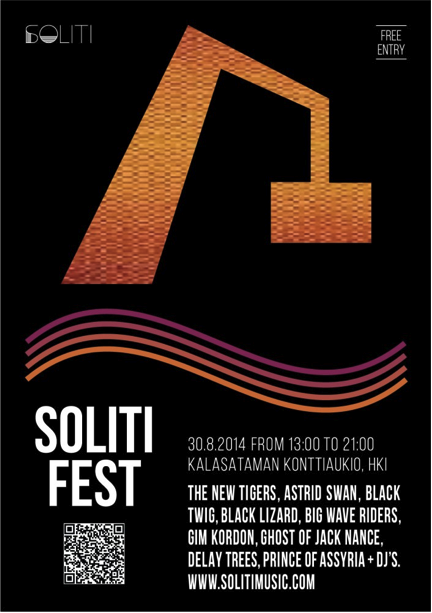The Soliti label was established in Helsinki in 2011 by British expat Nick Triani. Born in Croydon, London, Triani, of Italian origin, and a veteran of indie band Supermodel, he played SXSW in Austin in March ’98, then moved to Helsinki later that year after his partner, Finnish singer Astrid Swan was accepted into university: “When I moved here I missed seeing really great bands, but that has really changed in the last 10 years. Everyone comes to play here now’. Triani now has two sons, one of them thirteen, and has produced more than 50 records in Helsinki, starting with well-known Finnish hard rock band Apulanta, as well as working in A&R. He also worked for the Finnish label Johanna Kustannus, who took over the back catalogue of the legendary 60s label Love Records, until it was sold in 2011, and Triani was dropped, along with a few of the bands, like Cats on Fire, Delay Trees and Swan, whom he was producing on its subsidiary label Pyramid.
Love Records was always very artist friendly – releasing albums by legendary Finnish prog rock band Wigwam, as well as jazz artists like Jorn Donner and Edward Vesala, and a lot of avant-garde stuff which ended up on the essential Arctic Hysteria and Psychedelic Phinland compilations. Triani then decided to set up his own label, signing some of the bands from Pyramid like Cats on Fire and Astrid Swan, who played with a band called the Drunk Lovers. The current roster is predominantly of English language music by about ten Finnish groups, apart from a Swedish artist, Prince Of Assyria, who was born in Iraq, and Finnish language postpunk group Gim Gordon. Triani continues the artist-friendly policy of Love Records, and all Soliti bands own their own music. As he told James O’Sullivan in the English language monthly Six Degrees: “When I started the label I wanted to do something different. Having worked for many years in a big indie, it was very established and had a certain way of doing things, some of which I thought were unnecessary. I think it’s always about trying to reach your audience. The way a lot of labels work is that they try and reach everybody at once. I think indies are great at taking leftfield stuff and moving it to the centre; giving it some exposure to the mainstream … there’ not been a better time for young talent in Finland. People are finding a way to get their music out and there are so many young bands. It is a fantastic time. I wish the mainstream would pick up on that now, there is a real wave of this great talent and maybe it’s right under the radar, but if you scratch a bit you’ll find it … What is the purpose of a label in 2014 – is it just about selling records? I’m not so sure about that. In this day and age it’s about creating an aesthetic, a platform for artists to be discovered, or for the music to get out there and reach an audience through various platforms. People consume music in so many different ways now; it’s not just about a record landing in a shop. Of course, we want people to buy everything – for the artist it is really important, as they find a platform for exposure – without spending thousands of euros doing so. That’s the idea of the label: it’s multifunctional’.
Soliti focuses mostly on CD and vinyl formats: “I think the Finnish industry is very particular. There has never been a download culture here. What’s happened is that the Finnish industry has gone from physical straight to streaming. It’s missed the download part, which has been the mainstay of the UK, US and Japanese industries in the last ten years, for example’.
Apart from DJing (in English) every Sunday for the independent radio station Radio Helsinki, on a program called 8 ½, after the Fellini film, Triani arranges for Soliti bands to perform at the Flow Festival, took some of them to SXSW in Austin in 2013, and runs regular Soliti events around Finland, the most recent one being on August 30th at Konttiaukio, also known as Bermuda. This is possibly because it’s surrounded by almost triangular water, in the shadow of the giant Suvilahti power plant where the Flow Festival is held, and at the moment a circus is in full swing. It’s a free event, and this is definitely on the other side of the tracks, situated in a wasteland surrounded by slag heaps, with a half-constructed (and seemingly abandoned) apartment block in the distance with a crane alongside it, and a number of recycled, graffitied containers. A friend tells me it’s earmarked for development by the Hensinki city council, but at the moment its open for temporary use by almost anyone. It looks uncannily like the remnants of the “shelter village’ setting for Aki Kaurismäki’ 2002 film The Man Without a Past, in which the protagonist arrives in Helsinki and gets beaten up so severely he loses his memory, lives in a converted container, and with the help of the Salvation Army, tries to construct a new life.
It’s also a popular skateboarding area, and there are a couple of makeshift portaloos, and a stall selling food, coffee and cheap beer, but many have brought their own. Oddly, a number of “Hop On Hop Off’ red double decker tourist buses go past, seemingly to some kind of resting place. The police drive by at one point, and one wonders if it’s a “legal’ gig, but they don’ stop. The bands on offer are, in order of appearance, Big Wave Riders, Delay Trees, Astrid Swan (in a duo with guitarist and drummer; Swan also plays keyboards), Ghost of Jack Nance, Black Twig, The New Tigers, Gim Gordon, and Black Lizard. (The Prinve of Abyssinia has had to cancel due to illness.) Swan is the only female (the Finnish-Algerian singer Manna will be releasing her new album on Soliti in the autumn), singing songs from her fourth album, shaved bald. All the other bands are all-male affairs, who sound uncannily like the Christchurch and Dunedin bands on NZ’ Flying Nun label, although not so lo fi (or “lo tec’, as Chris Knox would put it). Now that Flying Nun is releasing remastered editions of its 1980s albums, this is perhaps not so evident. Delay Trees play engagingly intense melodic guitar pop, have three albums, a single and and two EPs, formed in 2007, and were described in We Are Helsinki as “young, but their mix of shoegazing walls, melancholy dream pop, cool art rock and 90s indie sounds very controlled and ready’. They have played in the UK, Germany, the Netherlands, Norway, Poland and Estonia. Their latest album is out on vinyl as well as CD.
The singer-guitarist of three piece Ghost of Jack Nance looks and sounds uncannily like Jamie Reid of Jesus and Mary Chain, in sunglasses, leather jacket and striped sweatshirt, with a touch of the Ramones for good measure, while the green haired-drummer beats a pair of snare drums and is totally covered by his hair. The band’ name is graffitied around the container stage, and on the portaloos, but they don’ appear to have a new release on Soliti yet, unlike all the others, although they have tracks on Bandcamp and Soundcloud, and released a compilation of their earlier work when they were a four-piece.
Black Twig are another jangly group, have been around since 2008, and are a bit like Straitjacket Fits at their most melodic. The New Tigers, based in Turku, whose latest is called The Badger, are a bit more poppy, with harmonies, like the Bats, and their drummer is also the lead guitarist of Cats on Fire. Their “late-Eighties indie-influenced twinkly guitar pop’ has been heard in Scandinavia and the UK. Black Lizard also sound like a fuzzed-up JMC, with touches of psychedelia. A lot of people arrive in time for cult band Gim Gordon (the event starts at 1.15 and ends before 9pm, early like most many events in Helsinki), many of them on bicycles, in keeping with the indie-hipster ethos.
It’s an odd phenomenon, this label of young bands in Helsinki recreating the sounds of British and US rock bands of the 80s and 90s for a new audience, but it seems to be working, and thriving.





